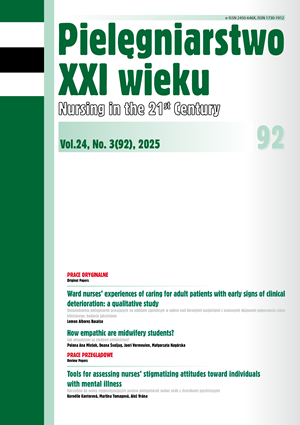Accepting, adapting and transcending:living with type 1 diabetes – a humanbecoming perspective
DOI:
https://doi.org/10.12923/pielxxiw-2025-0029Keywords:
type 1 diabetes mellitus, meaning, human becomingAbstract
ACCEPTING, ADAPTING AND TRANSCENDING: LIVING WITH TYPE 1 DIABETES A HUMAN BECOMING PERSPECTIVE
Aim. The study aims to investigate the lived experience of people with Type 1 diabetes mellitus, focusing on the challenges, adaptation strategies, and psychosocial effects, through the approach of the Theory of Human Becoming.
Material and methods. The research adopted a qualitative approach, with data collection through semi-structured interviews with 11 Type 1 diabetes mellitus patients. Thematic analysis was used to process the data, highlighting three main themes: making sense of the disease, adapting to the rhythm of everyday life, and overcoming difficulties.
Results. The diagnosis of Type1 diabetesmellitusis accompaniedby initial feelingsof shock, sadness,and denial. Gradually, patientsdeveloped self-management strategies, enhancing their resilience and self-awareness. Social support from family and friends played a key role in accepting and managing the disease. Despite the challenges, the experience of the disease led to personal growth and a redefinition of priorities in life.
Conclusions. The theory of Human Becoming provides valuable direction for understanding the experience of people with Type 1 diabetes mellitus. A holistic and personalized approach to care can enhance disease management, promoting patients’ quality of life and personal development.
References
1. Tuomilehto J. The emerging global epidemic of type 1 diabetes. Curr. Diab. Rep. 2013;13(6):795-804. https://doi.org/10.1007/s11892-013-0433-5
2. Oluchi E, Odeniyi IA, Okoye HC. Psychological impact of type 1 diabetes management. Diabetes Res. Clin. Pract. 2021; 177: 108841. https://doi.org/10.1016/j.diabres.2021.108841
3. van Duinkerken E, Snoek FJ, de Wit M. The cognitive and psychological effects of living with type 1 diabetes: a narrative review. Diabet. Med. 2020;37(4):555-563. https://doi.org/10.1111/dme.14216
4. Kalra S, Jena BN, Yeravdekar R. Emotional and psychological needs of people with diabetes. Indian J. Endocrinol. Metab. 2018;22(5):696-704. https://doi.org/10.4103/ijem.IJEM_579_17
5. Parse RR. The Human Becoming Theory: the was, is, and will be. Nurs. Sci. Quart. 1992;5(1):35-42. https://doi.org/10.1177/089431849200500109
6. Parse RR. The Human Becoming School of thought: a perspective for nurses and other health professionals. Thousand Oaks, CA: Sage Publications; 1997.
7. Mitchell GJ. Parse’s theory of human becoming: A critique. Nurs. Sci. Quart. 1999;12(2):126-132. https://doi.org/10.1177/08943189922106644
8. Mantzoukas S. Qualitative research in six easy steps. Epistemology, methods and presentation’. Nursery. 2007; 46(1): 236-246.
9. Braun V, Clarke V. Using thematic analysis in psychology. Qualitative Research in Psychology. 2006;3(2):77-101. https://doi.org/10.1191/1478088706qp063oa
10. Popoviciu MS, Kaka N, Sethi Y, et al. Type 1 diabetes mellitus and autoimmune diseases: a critical review of the association and the application of personalized medicine. J. Pers. Med. 2023;13(3):422. https://doi.org/10.3390/jpm13030422
11. Mansouri F, Darvishpour A. applying parse’s human becoming theory for caring of an elderly with spontaneous pneumothorax following the COVID-19: A case study. J. Caring Sci. 2023;13(1):3-11. https://doi.org/10.34172/jcs.2023.33017
12. Lalwani M, Jan R, Rattani S. Intersecting pathways: examining Hildegard Peplau’s and Rosemarie Parse’s nursing Theories through a Comparative Lens. Clin. J. Nurs. Care Pract. 2023; 7: 009-014. https://www.nursingpracticejournal.com/apdf/cjncp¬aid1046.pdf
13. Van Duinkerken E, Snoek FJ, De Wit M. The cognitive and psychological effects of living with type 1 diabetes: a narrative review. Diabetic Medicine. 2020;37(4):555-563. https://doi.org/10.1111/dme.13838
14. Due‐Christensen M, Willaing I, Ismail K, et al. Learning about Type 1 diabetes and learning to live with it when diagnosed in adulthood: two distinct but inter‐related psychological processes of adaptation A qualitative longitudinal study. Diabetic Medicine. 2019;36(6):742-752. https://doi.org/10.1111/dme.13838
15. Akhter K, Turnbull T, Simmons D. Influences of social issues on type 1 diabetes self-management: are we doing enough? Pract. Diabetes. 2016;33(9):307-312. https://doi.org/10.1002/pdi.2061
16. Núñez-Baila MÁ, Gómez-Aragón A, Marques-Silva AM, et al. Lifestyle in emerging adults with Type 1 Diabetes Mellitus: a qualitative systematic review. Healthcare. 2024;12(3):309. https://doi.org/10.3390/healthcare12030309
17. Kim JE, So HS. Experience of hope in terminal cancer patients: applying Parse’s human becoming methodology. Asian Oncol. Nurs. 2019;19(2):55-70. https://doi.org/10.5388/aon.2019.19.2.55
18. Hansen-Ketchum P. Parse’s theory in practice: an interpretive analysis. J. Holist. Nurs. 2004;22(1):57-72. https://doi.org/10.1177/0898010103261120
19. Koetsenruijter J, van Eikelenboom N, van Lieshout J, et al. Social support and self-management capabilities in diabetes patients: An international observational study. Patient Educ. Couns. 2016;99(4):638-643. https://doi.org/10.1016/j.pec.2015.10.029
20. Carreon SA, Duran B, Tang TS, et al. Here for You: a review of social support research in young adults with diabetes. Diabetes Spectr. 2021;34(4):363-370. https://doi.org/10.2337/dsi21-0013
21. Gerson J. Expressive narrative writing therapy with inflammatory bowel disease patients. Human Systems. 2024;4(2):115-124. https://doi.org/10.1177/2634404124122
22. Bergmame L, Shaw S. Clinical utility of psychoeducational interventions for youth with type 1 diabetes: a scoping review. Continuity in Education. 2021;2(1):76. https://doi.org/10.5334/cie.28
Downloads
Published
Issue
Section
License
Copyright (c) 2025 Georgia Liampa, Aikaterini Toska, Paraskevi Maria Prapa, Maria Saridi, Vissarion Bakalis, Eleni Albani, Pavlos Sarafis, Chryssoula Dafogianni, Evangelos Fradelos (Autor)

This work is licensed under a Creative Commons Attribution 4.0 International License.




